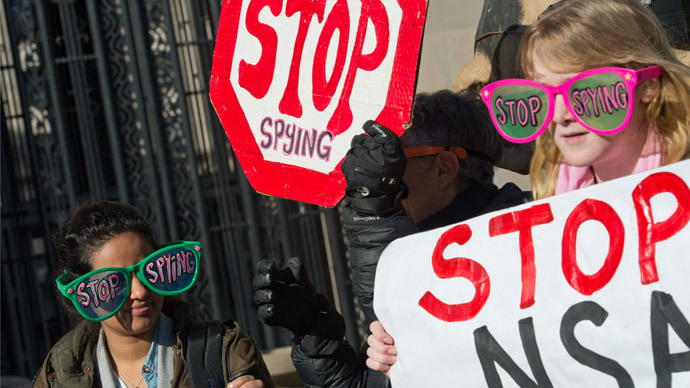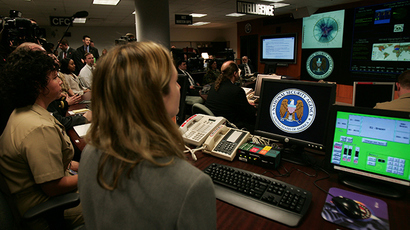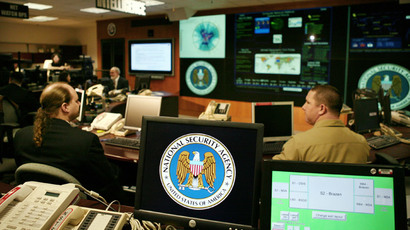Rewind and Play: NSA storing “100 percent” of a nation’s calls

In contrast to the National Security Agency’s past remarks that it only collected the ‘meta data’ on calls, it has been revealed that the spy agency is able to record and listen to the audio content of a foreign country’s telephone calls.
The billions of audio recordings, which are reportedly held for a period of 30 days, provides a glimpse “into the past,” giving the spy agency the power to “retrieve audio of interest that was not tasked at the time of the original call,” according to The Washington Post, citing anonymous sources with knowledge of the system.
A senior manager for MYSTIC, which employs a rather sinister-looking wizard as its emblem, said the program is like a “time machine” that can replay communications from any call without requiring that an individual be listed in advance for surveillance.
News of the NSA’s actual power to eavesdrop on communications around the world comes on the same day that former NSA contractor-turned-whistleblower, Edward J. Snowden, told a conference in Vancouver via video conference: "There are absolutely more revelations to come."
MYSTIC, which is depicted in NSA literature by a rather sinister-looking cartoon wizard, attained “full capacity” against its first – and allegedly only – target country in 2011, while documents two years later showed plans to expand the operation into other countries.
The Washington Post said it is withholding information that could be used to identify the country where the program is being used as requested by US officials.
Employing the so-called RETRO program, short for “retrospective retrieval,” together with powerful voice recognition technologies, NSA analysts sift through “only a fraction of 1 percent of the calls.” Given the huge number of communications collected, however, the absolute numbers “are high.” Each month, according to the report, the NSA stores away “millions of voice clippings.”
The US intelligence community continues to defend the powerful technologies, saying they are a vital tool in the fight against terrorists.
Caitlin Hayden, spokeswoman for the National Security Council, said the previously concealed program was a necessary component in the fight against “new or emerging threats” that are “often hidden within the large and complex system of modern global communications, and the United States must consequently collect signals intelligence in bulk in certain circumstances in order to identify these threats.”
Meanwhile, NSA spokeswoman, Vanee Vines, said that “continuous and selective reporting of specific techniques and tools used for legitimate US foreign intelligence activities is highly detrimental to the national security of the United States and of our allies, and places at risk those we are sworn to protect,” in an email to the Post.
Vines said the NSA’s work is “strictly conducted under the rule of law.”
Despite the public uproar over the full scope of NSA’s surveillance program, the spy agency seems determined to expand its clandestine activities. Last year’s intelligence budget listed five more countries for which the MYSTIC program provides “comprehensive metadata access and content.” A sixth country reportedly made it to the list last October.
The budget does not specify whether the NSA is presently recording telephone communications in those countries or anticipates doing so in the future.
Meanwhile, critics of the vast surveillance network will inevitably vacuum data from Americans who happen to have contacts inside the target country. In the event that Americans were being pulled into the net, this would seem to fly in the face of Obama’s January 17 pledge “that the United States is not spying on ordinary people who don’t threaten our national security…we take their privacy concerns into account.”
An independent group appointed by Obama, entitled The President’s Review Group on Intelligence and Communications Technologies, advised in December that incidentally collected US communications, including those picked up from destinations abroad, should practically always be “purged upon detection.”
The US leader refused to accept that recommendation.
Thus, it should come as no surprise that the NSA was able to capitalize on Obama’s new policy directive instructing that guidelines on the bulk collection of communications “do not apply to signals intelligence data that is temporarily acquired to facilitate targeted collection.”
Anonymous sources told the Post that the NSA makes no effort to block the telephone communications of American citizens, defining them as legitimate targets “acquired incidentally as a result of collection directed against appropriate foreign intelligence targets.”
According to RETRO’s internal reports, the NSA has a strong motive to deploy the system in as many foreign countries as possible.
Meanwhile, attention on the clandestine activities at the 35,000-employee NSA, headquartered at Fort Meade, Md, will probably not go down any time soon.
Edward Snowden on Tuesday appeared on a video screen at the TED ("Technology Entertainment Design") conference, where he told the audience in Vancouver - without ever leaving Moscow, where he has been given temporary asylum – that the world should expect “more revelations.”
"There are absolutely more revelations to come," he said. "Some of the most important reporting to be done is yet to come."
Snowden urged telecommunication firms to resist cooperating in spying activities against not just Americans, but people from all over the world.
"More communications are being intercepted in America about Americans than there are in Russia about Russians," Snowden said.
The American whistleblower advocated on behalf of a campaign by Tim Berners-Lee, the founder of the worldwide web, for a global ‘Magna Carta’ that sets down Internet rights.
"A Magna Carta for the internet is exactly what we need," Snowden said.














